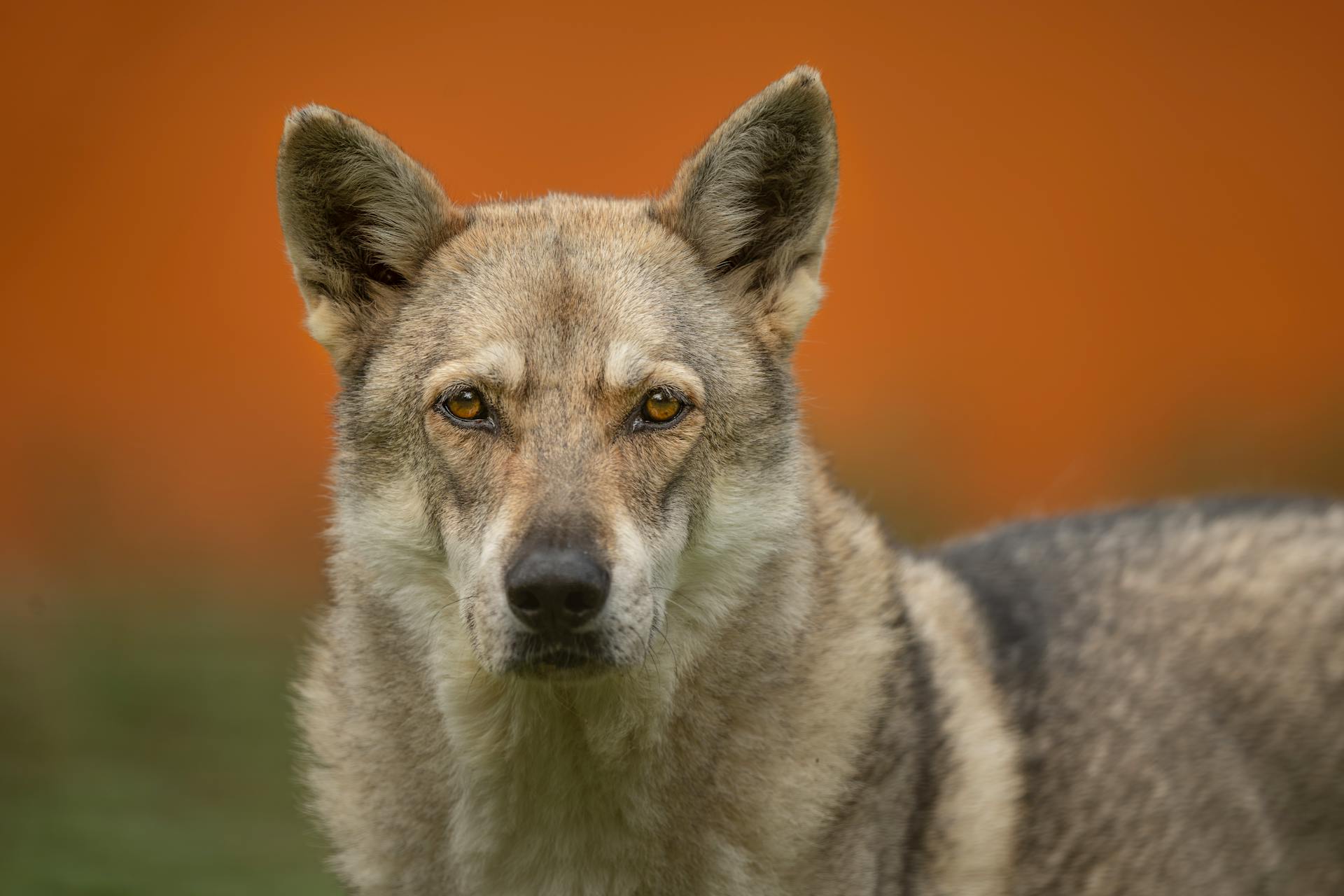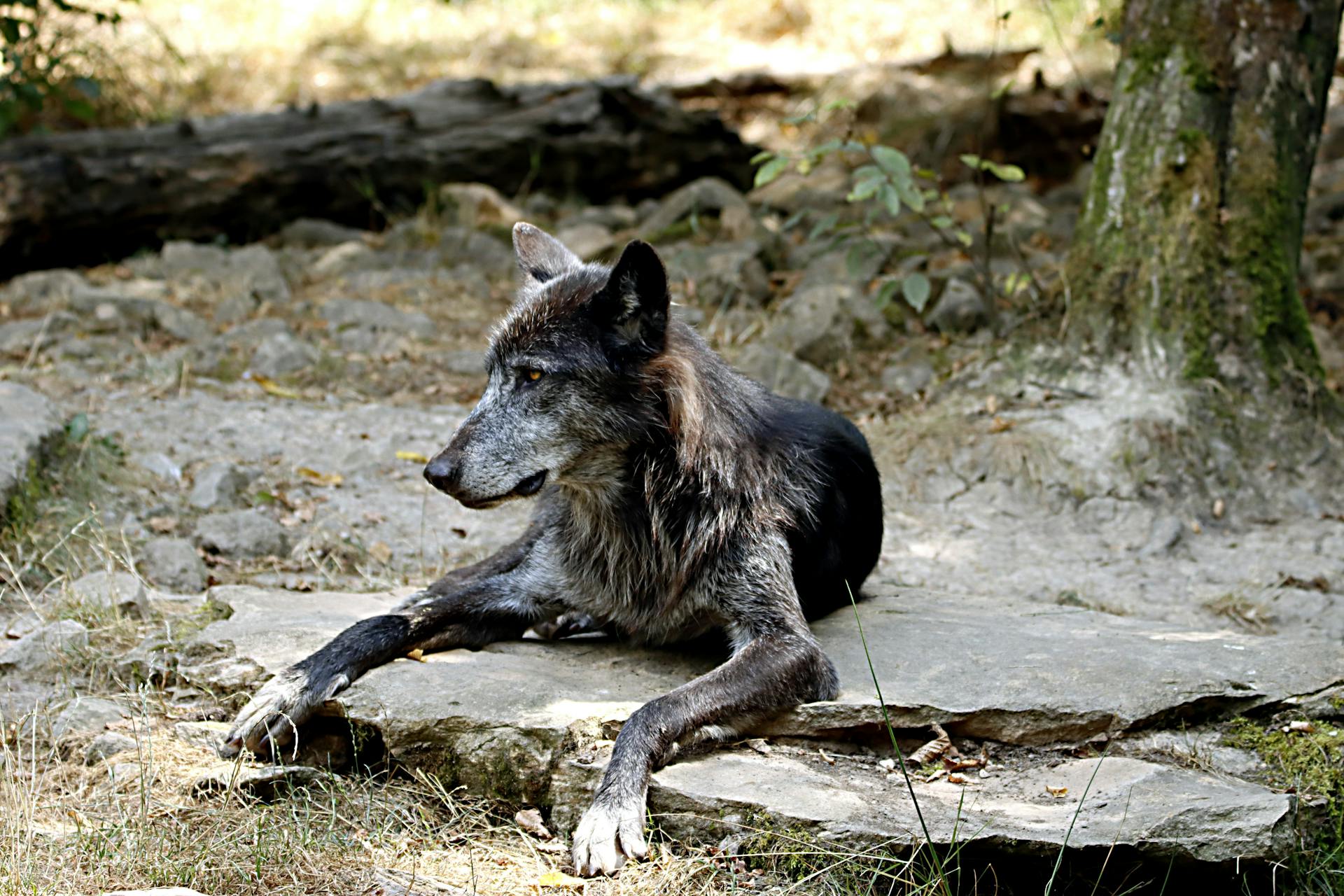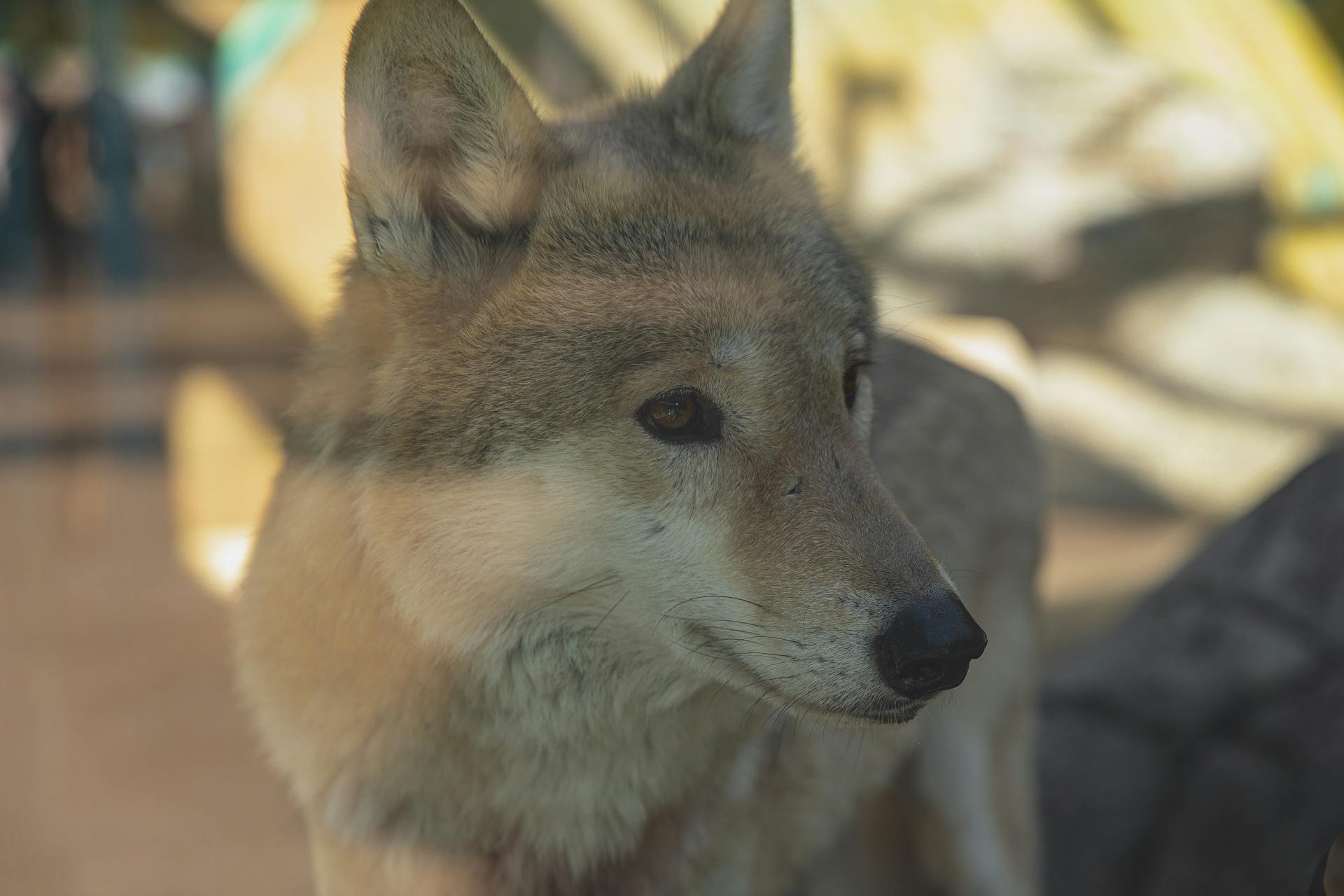
Wolf and wolfdog breeding is a complex process that requires careful consideration and planning. In the wild, wolf packs are typically formed by a dominant male and female, and their offspring remain with the pack for several years.
Wolfdogs, on the other hand, are a domesticated breed that can make great pets for the right owner. They are often the result of breeding a wolf with a domesticated dog.
Wolf and wolfdog breeding laws vary by country and region, but many places have regulations in place to protect both humans and animals. For example, in some areas, wolfdogs are considered exotic animals and require special permits to own.
If you're considering bringing a wolfdog into your family, it's essential to research and understand the needs and responsibilities involved in caring for these unique animals.
Wolf and Wolfdog Breeds
Wolf and wolfdog breeds can be quite challenging to manage, as even experienced dog handlers can struggle with their unique needs and behaviors. The Alaskan Malamute Wolf hybrid, for example, is known to be skittish and stubborn.
However, for those who are willing to put in the time and effort, these breeds can make great companions. The Alaskan Malamute Wolf hybrid is playful, loving, and sweet, but it does require regular attention and exercise to prevent destructive behavior.
Producing wolf hybrids raises questions about the welfare of both the dogs and the wolves involved, as their specific social and environmental needs may not be adequately met in a domestic setting.
Siberian Husky
The Siberian Husky is a breed that's often crossed with wolves to create a unique hybrid. The Siberian Husky wolf mix is a crossbreed between a Siberian Husky and a wolf, resulting in a strong pack mentality.
They're considered quite shy, but with proper training and socialization, they can make loyal and loving pets. However, they have a strong prey drive and may not be suitable for households with cats or other small animals.
As they're extremely intelligent, they require a lot of exercise, both physically and mentally, to stay healthy and happy. They can get bored fast and are always full of energy, so owners need to keep them engaged and active.
The Husky Wolf dog breed is not recommended for households with young children, as their pack mentality can make them unpredictable.
Discover more: New Wolfdog Breed
Alaskan Malamute
The Alaskan Malamute is a loyal and loving breed, known for being sweet and making great companions. They can be skittish and stubborn at times.
This breed has a loud bark and needs regular attention to prevent destructive behavior. If left alone for too many hours, they may destroy things.
It's best not to leave Alaskan Malamutes alone with small children and pets due to their intense prey drive.
A different take: Half Wolf Half Husky Breed
Dogs and Humans
Dogs have been domesticated from wolves, resulting in the vast array of breeds we see today.
Dogs and humans have formed a unique bond over thousands of years, with dogs becoming an integral part of many families.
Their genetic closeness to wolves has allowed dogs to thrive in various environments and roles, from hunting companions to loyal companions.
Despite their differences in nature, dogs have adapted to living alongside humans, often displaying a range of emotions and behaviors that are similar to those of humans.
Consider reading: Alaskan Malamute Wolves
German Shepherd
The German Shepherd is a breed that's already quite impressive on its own, but when you mix it with a wolf, you get a dog that's truly one-of-a-kind.
This hybrid, also known as the Wolf Shepherd, can reach between 50 and 100 pounds and stand between 20 and 26 inches tall when fully grown.
German Shepherd wolf hybrids are extremely curious, so it's essential to make sure your backyard is secure to prevent them from roaming off.
If you socialize and train this breed well, they can get along with other pets in the house, but it's still not recommended to leave them alone with smaller pets like rabbits or hamsters.
Curious to learn more? Check out: Are Wolf Dogs Good Pets
Great Dane
The Great Dane is a majestic creature, known for its large size and powerful build. It's a breed that commands attention, but it's not for everyone.
In fact, Great Danes are one of the largest dog breeds around, with some individuals reaching up to 32 inches in height and weighing over 200 pounds. That's a lot of dog to handle!

Great Danes are highly intelligent, but they can be challenging to train, especially for first-time dog owners. They have a strong will and may not always listen to commands, so it's essential to be consistent and patient when training them.
Their temperament can be uncertain, making them wary of strangers and sometimes aggressive towards other dogs. This is why socialization is crucial for Great Danes from an early age.
As a seasoned pet owner, you might find that a Great Dane is a rewarding companion, but it's not a breed for the faint of heart.
The Relationship Between Dogs and Humans
Dogs and humans share a unique bond that's been shaped over thousands of years of domestication.
Dogs were domesticated from wolves, and this common ancestry explains why they're so attuned to human behavior.
Their ability to read our body language and emotions is a testament to their keen observational skills.
Dogs have undergone selective breeding to become the diverse range of breeds we see today.
This selective breeding has resulted in distinct differences in their natures, but they still retain some of their wolf-like traits.
Dogs are incredibly social animals, and their pack mentality is a remnant of their wild past.
They thrive on interaction and attention from their human family members, and they'll often go to great lengths to get it.
Their ability to form strong bonds with humans is a key aspect of their domestication.
Pet Ownership and Regulations
Owning a wolfdog can be a challenging and potentially heartbreaking experience. It's not generally recommended or advised to keep wolfdogs as pets, especially when there are so many other breeds and crossbreeds available.
In fact, many people have found that wolfdogs are unmanageable, and sadly, 90% of wolfdogs and wolves kept as pets are euthanized by 2 years old. This is due to their demanding and difficult temperaments, health, and genetics.
If you're considering owning a wolfdog, it's crucial to prioritize their well-being over personal interests or financial gain. Breeding of wolfdogs must only be undertaken by knowledgeable individuals who have a deep understanding of both dog and wolf behavior, genetics, and welfare.
Explore further: Wolf Dogs as Pets
Population Impact
Breeding wolfdogs can dilute the population of wild wolves and their genetics, making it more challenging to conserve and protect these animals.
The introduction of dog genes into wolf populations can disrupt natural selection processes and weaken the diversity of wild wolf populations.
Conservation efforts aimed at preserving wolves and their communities are critical for maintaining the natural world.
Breeding wolf hybrids can divert attention and resources away from these efforts, potentially jeopardizing the survival of the wild wolf.
Having a Pet
Having a pet can be a wonderful experience, but it's essential to consider the needs and responsibilities involved. Owning a pet is a big commitment, and it's not suitable for everyone.
Some pets, like wolfdogs, are particularly challenging to care for. Wolfdogs require specialized care and attention due to their demanding and difficult temperaments, health, and genetics.
It's crucial to prioritize the well-being of any animal over personal interests or financial gain. Breeding of wolfdogs must only be undertaken by knowledgeable individuals who have a deep understanding of both dog and wolf behavior, genetics, and welfare.
Many people have found that wolfdogs are unmanageable, and sadly, every year, many are abandoned, rescued, or euthanized. In fact, 90% of wolfdogs and wolves kept as pets are euthanized by 2 years old.
Responsible ownership and breeding practices are of utmost importance when considering owning a pet. It's not generally recommended or advised that wolfdogs be kept as pets, especially when there are so many other breeds and crossbreeds available.
Breeding Regulations
In many jurisdictions, breeding dogs with wolves is heavily regulated due to ethical concerns and potential risks.
Some countries and states prohibit these breeds altogether, or have strict regulations requiring permits and specialized facilities.
Violating these laws can result in hefty legal consequences, so it's essential to research the regulations in your area before considering breeding wolfdogs.
In the U.K., wolfdogs are legal if they are three generations away from the original wolf parent, but this may not be the case where you live.
You must conduct your own research to determine the specific regulations in your area.
The regulations aim to ensure the welfare and protection of all animals involved in breeding wolfdogs.
Sources
Featured Images: pexels.com

